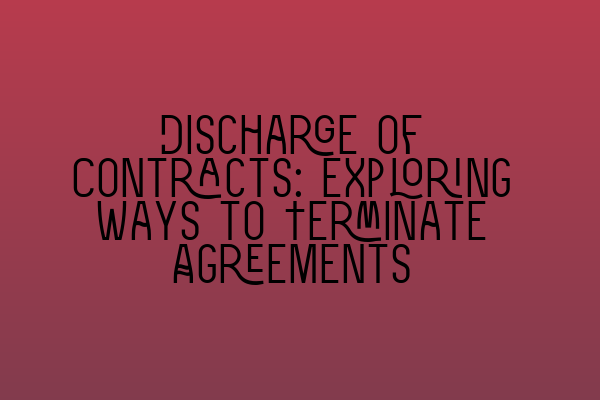Discharge of Contracts: Exploring Ways to Terminate Agreements
Contracts are an integral part of business transactions and personal dealings. They establish the rights and obligations of the parties involved, providing a framework for legal protection. However, there may come a time when one or both parties wish to terminate the agreement. In this article, we will explore the various ways contracts can be discharged and terminated.
1. Performance
One of the most common ways to discharge a contract is through performance. When both parties fulfill their obligations as outlined in the agreement, the contract is considered satisfied. This can be seen in scenarios such as a seller delivering goods and a buyer making payment.
However, it’s important to note that performance must be exact. If there are any deviations or breach of terms, the innocent party may have grounds for termination or seeking damages. It is advisable to have a clear understanding of the contract terms and the standard of performance expected.
2. Agreement
Another way to discharge a contract is by mutual agreement. If both parties agree to terminate the contract before the performance is completed, they can enter into a new agreement or simply agree to release each other from their obligations. It is crucial to ensure that the agreement to terminate is documented in writing to avoid any potential misunderstandings or disputes.
SQE 1 Practice Mocks FLK1 FLK2
3. Frustration
Frustration occurs when unforeseen events or circumstances make it impossible to fulfill the contractual obligations. These events are beyond the control of both parties and render the contract impossible to perform. Examples of such events include natural disasters, legislation changes, or the death of a party involved.
To successfully discharge a contract on the grounds of frustration, the event must be truly unforeseeable and render the contract impossible to perform. Parties may need to provide evidence to support their claim of frustration.
4. Breach of Contract
When one party fails to fulfill their obligations as stated in the contract, it is considered a breach. A breach of contract can be material, meaning it goes to the core of the parties’ agreement, or minor, which is a less significant violation. Depending on the nature and severity of the breach, the innocent party may have the right to terminate the contract and seek damages.
If you find yourself in a situation where the other party has breached the contract, it is crucial to review the terms of the agreement and seek legal advice to assess your options.
5. Operation of Law
Contracts can also be discharged by operation of law. This occurs when changes in legislation or legal principles make it necessary to terminate the contract. Examples include the bankruptcy of one of the parties or the illegal nature of the agreement itself. In these cases, the contract is considered void from the beginning.
It is important to note that each situation is unique, and legal advice should be sought to determine if a contract can be discharged by operation of law.
Contracts serve as a foundation for business relationships and personal agreements. Understanding the different ways contracts can be discharged provides parties with the knowledge and tools to navigate through unforeseen circumstances or disputes.
Remember, whether it’s through performance, mutual agreement, frustration, breach, or operation of law, the termination of a contract should always be approached with caution. Seeking legal advice can help ensure your rights and obligations are protected.
